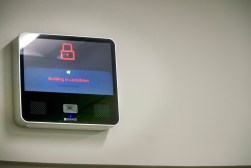Police real-time crime centers are becoming data powerhouses

Against a backdrop of concern about expanding surveillance, law enforcement agencies across the country have spent the last several years establishing real-time crime centers. And recent advances in technology have made these operations more complex, leading to renewed concerns about proactive policing.
While real-time crime centers have been popping up since the mid-2000s, agencies are now using software built and maintained by companies like Fusus that are turning the outposts into data powerhouses. Crime centers are consolidating information from traffic cameras, drones, gunshot detection sensors and other sources of intelligence into single platforms.
According to testimonials on Fusus’ website by law enforcement agencies that are strapped for resources, the software allows officers to expedite their investigations and “see real-time what’s going on.” But watchdog groups warn that a lack of oversight creates potential for misuse.
StateScoop reached out to six law enforcement agencies that use Fusus, but not many wanted to talk about their centers or how they used Fusus. Fusus also did not respond to requests for an interview. Two agencies did respond: the Hillsborough County Sheriff’s Office in Tampa, Florida, and the Cobb County Police Department in Marietta, Georgia.
Direct feeds
Fusus, a Georgia company that specializes in public safety software, owns one of the most commonly used platforms in real time crime centers. Out of the 135 established or forthcoming real-time crime centers documented by the Electronic Frontier Foundation’s Atlas of Surveillance project, about 20% use Fusus’ cloud-based platform.
According to its website, Fusus “combines video with other utilities like [automatic license plate readers], gunfire detectors, real-time officer geolocator feeds, a registry map of all the public and private cameras in your region, a multi-media tips line for the public, and a digital evidence vault for investigators.”
Sgt. Darin Hull, who leads Cobb County Police Department’s Real Time Crime Center, told StateScoop the department partnered with Fusus in September of 2021. He said that even though CCPD does not own any cameras itself, Fusus allows it to access two sources of video surveillance: an integrated camera network and a camera registry.
The registry allows citizens and businesses to voluntarily alert law enforcement of their cameras but investigators still need to ask for permission to see the footage. The integrated system, however, feeds directly into the real-time crime center, and once residents or businesses opt to integrate the cameras, police have continual access. Hull said there are 500 integrated cameras in Cobb County, but the majority of them are owned by the transportation department. He added that he hopes to acquire more. By comparison, he said, the neighboring Atlanta Police Department has about 1,800 cameras.
‘All the little data points’
While traditional police work is reactive, law enforcement’s access to a continual feed of video and data makes proactive policing a growing possibility. Groups like the American Civil Liberties Union have warned about surveillance and proactive policing for decades, citing the ineffectiveness of policies like stop-and-frisk and how constant surveillance can infringe on constitutional expectations of privacy.
Law enforcement proponents say proactive policing makes cities safer. In 2017, then-U.S. Attorney General Jeff Sessions wrote in an opinion piece for USA Today advocating for proactive policing, citing declining arrest rates and rising crime. The New York Police Department this year credited proactive policing with drops in serious crime rates across the city.
Cobb County’s Hull said that while his real-time crime center can enable proactive policing, his department chooses not to.
“For us, we have too many data feeds coming in because real-time crime centers also incorporate license plate readers, officer locations, body cameras — all the little data points and all the technology we have for the police department all feed in,” Hull said. “So we don’t really have time to proactively monitor cameras. We respond to calls for service.”
The Hillsborough County Sheriff’s Office, meanwhile, told StateScoop that its real-time crime center camera network “can be monitored to address proactive and/or reactive criminal investigations.”
‘Some level of skepticism’
Lauren Bonds, executive director of the National Police Accountability Project, told StateScoop that, like Cobb County, most law enforcement agencies present their use of video surveillance technologies in a way that’s limited by their own policies, but that doesn’t assuage watchdogs’ concerns about misuse.
“It’s not unreasonable to have some level of skepticism about how these systems are being used, because there have been so many instances of the presentation versus reality not matching up when it comes to this stuff,” Bonds said.
Fusus offers integration with technologies like facial recognition, which is known to produce false matches. At least three people have been arrested by Detroit police following false matches.
Hull said his department signed a contract with the facial recognition company Clearview AI earlier this year, but community members were vocal about the tech not being used in the real-time crime center.
“One of the major concerns was that we don’t want facial recognition used with live surveillance, live video,” Hull said. “So what we did is we crafted a policy procedure where facial recognition does not touch a real time crime center. There is a Great Wall of China that we have built between those two entities.”
‘Deeper pockets’
When asked about passive surveillance, Hull said his department doesn’t want to collect footage of civilians that doesn’t serve an investigatory purpose, which is why his department’s Fusus system only stores about a week’s worth of video data.
“Not only do we not want to collect it based on what our citizens have told us, we don’t want to record and be like ‘Hey, in 2021, you left this gas station, right?’ We only want it for an investigative window,” he said.
Hull said the crime center hasn’t garnered public concerns about privacy and surveillance, which he credited to the department’s efforts in involving the community throughout the process of implementing the technology.
“I think part of the reason why we got there is because with the Cobb County Police Department, it’s not just lip service when we talk about wanting to reach out to our community, proactively build good relationships and get feedback. I think that’s part of the reason why we haven’t had the complaints,” Hull said.
But Bonds of the National Police Accountability Project said that despite good intentions and even community involvement, when law enforcement agencies enter public-private partnerships, the potential for misuse is still present. And the internal operations of these partnerships are protected: The Hillsborough County Sheriff’s Office cited the “sensitive nature of the technology and its use in the intelligence gathering process” as its reason for only vaguely responding to questions about its real-time crime center.
“Whenever there’s a financial incentive involved with anything in policing, and incarceration, on the part of the corporate entity, there’s oftentimes going to be corners cut,” Bonds said. “I think corporations just have very different incentives. And lawsuits are less of a problem to them, because they have deeper pockets, frankly.”






